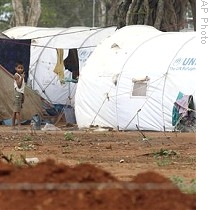New Delhi
18 September 2009
 |
| A boy stands in a Menik Farm displaced persons camp in Vavuniya, Sri Lanka (May 2009 file photo) |
The promise to allow the Tamil refugees to return to their villages was made during a meeting Friday in Colombo between Sri Lankan President Mahinda Rajapakse and U.N. Under Secretary General for Political Affairs, Lynn Pascoe.
Pascoe, who is visiting Sri Lanka, met the President to press him to speed up the release of more than a quarter million Tamil refugees, who remain confined in camps four months after the military crushed the Tamil Tiger rebels. They had fled their homes to escape the fighting between the two sides.
The government has come under international criticism for the slow pace at which the refugees have been released. So far only 15,000 have been allowed to leave the camps.
Sri Lanka is assuring that will change. A statement from the President's office said that the refugees will be sent back as soon as the areas where they lived are cleared of mines. It said new demining equipment will allow all the Tamil civilians to be resettled by end of January.
U.N. spokesman in Colombo, Gordon Weiss, welcomed the pledge, pointing out that the conditions in which the refugees are living "are less than ideal."
"Any such statement by the President accompanied by measurable progress is very welcome," he said. "The return of displaced persons to their homes would be a very visible sign and measurable sign of progress in Sri Lanka."
The government says it has detained the refugees because it needs to demine the villages, and it wants to screen the people and weed out any former Tamil Tiger militants.
After a visit to several refugee camps, Pascoe had said that "noone should be kept in such conditions longer than necessary."
Pascoe also raised the issue of a mechanism to address the issue of alleged human rights violations conducted during the war. So far Sri Lanka has turned down international calls to investigate violations.
Sri Lanka's quarter century long civil war ended this May after the government inflicted a decisive defeat on the Tamil Tigers, who had fought for a separate homeland for the minority Tamil community.